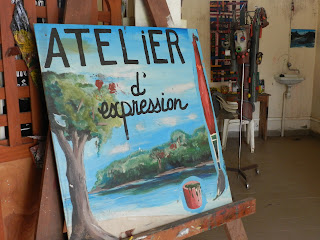
The
positive result brought his life to a complete stop: a red light. He didn’t
work for months and struggled to make sense of his diagnosis. He had not had
many partners and had not used intravenous drugs. Being HIV positive was not
what he had planned for his life, a life he had envisioned spending working as
an elementary school teacher.
Slowly he began to accept the diagnosis and
integrated antiretrovirals into his daily routine. Eventually HIV became a
part of every aspect of his life, including his work.
Now, after 12 years of antiretroviral
treatment, Jules DeL’an is helping other young people with HIV understand their
diagnosis. As founder of “Association
Jeune Sida or The Youth Aids Association” he runs an art program for young
people, seropositive and seronegative, giving them a safe place to express
their feelings. He also serves as a hospital’s HIV counselor, meeting with
patients before their test and aiding the newly diagnosed.
The Atelier d'expression has been in operation for more than five years, giving youth and patients a creative outlet. The atelier (french for workshop) is full of paintings and sculptures collected over several years.
As a part of his work, he conducts artistic activities and one-on-one counseling in an
office located near the entrance of Hopital Albert Schweitzer. The room is
bright and open, and sunlight comes through the windows to illuminate a
collection of artwork. The paintings, tapestries and sculptures that fill the
office are at times bright, optimistic and hopeful. Some are more somber and
serious.
On the day that I came to see him, Jules
spent the most time explaining one painting. He stood next to it, animated and
forceful:


“Aids has no face, but it has feet. It goes from village to village, from person to person. This painting shows the disease walking, walking out of fire and up off the page.”
The only time I had seen him more animated
was when he delivered his daily educational presentations. I first heard of his
talks from my roommate, who is another medical student working in pediatrics.
She had seen him in the lobby talking to a group of mothers.
It was a almost a week before I saw one
myself. As usual, I was rushing to the laboratory to retrieve results for a
patient and, in my haste, almost collided with a gentleman talking to the
patients in the waiting room. I mumbled my “sorry” and as I started to walk
away noticed he was holding a wooden replica of a phallus. Taken aback, I paused
to listen.
He spoke in a loud, clear voice.
“HIV is
transmitted mostly through having unprotected sex. If you have any questions
about how to use condoms or where to get them, please stop by my office and I
can help.”
I didn’t
stay to hear the rest of his presentation, but when I met with him another day,
I learned that he reveals his seropositivity each time he speaks.
“Its
humiliating.” He said. “And difficult every day and every time. People
discriminate and don’t want to shake my hand.” He said, holding out his hand to
me.
What preoccupies many patients in Gabon and
abroad , is the question of “How did I
get this virus?” For most that answer is a sexual encounter with someone they
did not know was infected. For Jules, the question was a preoccupation as well.
He wonders if his ceremony of initiation, a rite of passage for young Fang men,
was the source of his infection. During the initiation, he and the other boys
in his town were marked with the same razor and given two thin lines, barely visible in
his hairline.
Despite his occasional thoughts of how he
contracted the virus, today he is more occupied with educating other
young Gabonese people. Here, he says, people are extremely suspicious and,
filled with misconceptions of how transmission occurs. In their ignorance, they often condemn those who are
seropositive.
“ In Gabon we have a name for that judgment, kongossa.” He wrote it on the board to show me, adding adjectives I could understand.

I had already seen this kongassa at work throughout the
hospital. I sit beside Dr. Fany and Dr. Justin as they try to educate their
patients about HIV and about their sexual health. I have seen many seropositive
patients who refused to accept their diagnosis and as a result had not adhered
to their (free) treatment.
The
battle in Gabon against HIV is won one person at a time, through the dedication
of health professionals and lay persons like Jules. They work to spread the
message: For those who seek treatment and adhere to it, life with HIV in
Central Africa is not a death sentence.
As I
watched Jules write words of ignorance and misunderstanding on the chalkboard,
I saw the teacher he had planned to become. I left his office with a feeling a deep respect and
appreciation; I hope that he continues to find the strength to continue his
work.





Thanks for sharing! The reality is tragic but fighter like Jules motivates us to keep moving forward with a smile.
ReplyDeleteI will definitely follow your writtings...